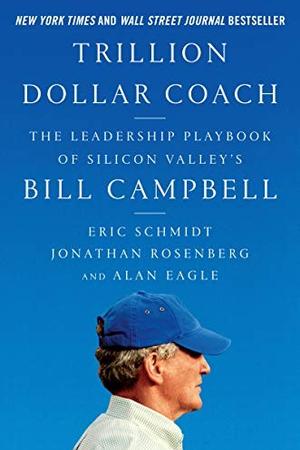
Trillion-Dollar Coach by Eric Schmidt, Jonathan Rosenberg & Alan Eagle: Summary & Notes
by Eric Schmidt, Jonathan Rosenberg & Alan Eagle
Related reading: 48 Laws of Power Summary, Discipline Equals Freedom, Greene's 33 War Strategies
In One Sentence
Bill Campbell coached Steve Jobs, Jeff Bezos, and Google's founders with the same principles: people first, trust above all.
Key Takeaways
- People are the foundation
- Build trust through listening
- Be honest and direct
- The coach is behind the scenes
- Start meetings with personal connection
- Love and support unconditionally
Summary
The most extraordinary part of this book is that an individual like Bill Campbell - who coached many of the top founders in the Valley simultaneously, including Steve Jobs and the Google cofounders - actually existed. The management principles are solid, and woven nicely into the story of Bill’s life, which makes the book easy to read. Aligns well with Principles.
Who Should Read This Book
- Executives and leaders
- Silicon Valley history buffs
- Coaches and mentors
FAQ
Who was Bill Campbell?
The "coach" of Silicon Valley who advised Steve Jobs, Google founders, and Amazon—combining business acumen with genuine care.
📖 Chapter-by-Chapter Breakdown
Click to expand the full detailed notes for every chapter →
📖 Chapter-by-Chapter Breakdown
Click to expand the full detailed notes for every chapter →
Notes
- Being a good coach is essential to being a good manager and leader.
- The top priority of any manager is the well-being and success of her people.
- Start meetings with trip reports, or other types of more personal, non-business topics.
- Your writing, including emails, should be concise, clear and compassionate.
- Have a structure for 1:1s, and take the time to prepare for them, as they are the best way to help people be more effective and to grow.
- The manager’s job is to run a decision-making process that ensures all perspectives get heard and considered, and, if necessary, to break ties and make the decision.
- Define the “first principles” for the situation, and help guide the decision from those principles.
- Aberrant geniuses - high-performing but difficult team members - should be tolerated and protected as long as their value outweighs the toll.
- Compensating people well demonstrates love and respect and ties them strongly to the goals of the company.
- The purpose of a company is to bring a product vision to life. All the other components are in service to product.
- If you have to let people go, be generous, treat them well, and celebrate their accomplishments.
- It’s the CEO’s job to manager boards, not the other way around.
- The traits that make a person coachable include honest and humility, the willingness to persevere and work hard, and a constant openness to learning.
- Listen to people with your full and undivided attention - don’t think ahead to what you’re going to say next - and ask questions to get to the real issue.
- Never embarrass someone publicly.
- Be relentlessly honest and candid, couple negative feedback with caring, give feedback as soon as possible, and if the feedback is negative, deliver it privately.
- Don’t tell people what to do, tell them stories about why they are doing it, and help guide them to the best decisions for them.
- Believe in people more than they believe in themselves, and push them to be more courageous.
- People are most effective when they can be completely themselves and bring their full identity to work.
- When faced with a problem or opportunity, the first step is to ensure the right team is in place and working on it.
- Pick the right players: the top characteristics to look for are smarts and hearts: the ability to learn fast, a willingness to work hard, integrity, grit, empathy, and a team-first attitude.
- Pair people: peer relationships are critical, and often overlooked, so seek opportunities to pair people up on projects or decisions.
- Make sure to get feedback from your peers - you should cover core attributes, product leader attributes, and open questions.
- Winning depends on having the best team, and the best teams have more women.
- Identify the biggest problem, bring it front and centre, and tackle it first.
- Air all negative issues, but don’t dwell on them. Move on as fast as possible.
- Strive to win, but always win right, with commitment, teamwork, and integrity.
- Leaders lead. You need to commit. You can’t have one foot in and one foot out, because if you aren’t fully committed then the people around you won’t be, either.
- When things are going bad, teams are looking for even more loyalty, commitment, and decisiveness from their leaders.
- Listen, observe, and fill the communication and understanding gaps between people.
- Leader teams become a lot more joyful, and the teams more effective, when you know and care about the people.
- To care about people you have to care about people: ask about their lives outside of work, understand their families, and when things get rough, show up.
- Cheer demonstrably for people and their successes.
- Build communities inside and outside of work. A place is much stronger when people are connected.
- Be generous with your time, connections, and other resources.
- Hold a special reverence for - and protect - the people with the most vision and passion for the company.
- Loving colleagues in the workplace may be challenging, so practice it until it becomes more natural.
- As you get past your fifties, be creative, don’t be a dilettante (commit to things), find people who have vitality and surround yourself with them, apply your gifts, and don’t waste time worrying about the future.
- Bill’s measurement of success: how many great leaders he has helped create.



